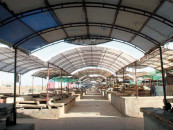Environmental racism
The idea that people of colour are more vulnerable to environmental hazards needs to be qualified

Climate induced disasters, such as a drought or a flood, do not care about the colour of our skin. However, the world is structured in a way that people of colour are facing the brunt of environmental hazards they have done little to cause. This phenomenon is pervasive and evident enough to be described by a specific term, namely ‘environmental racism’.
Of course, the idea that people of colour are more vulnerable to environmental hazards needs to be qualified. Some generalisations can be made about people in the global south being faced with similar hazards, such as deteriorating air quality or increasingly intense heatwaves. But not all people of the same skin colour experience these hazards with the same level of intensity. People of colour who are well-off can afford to shield themselves from the worse effects of environmental racism by virtue of where they reside, what they do, and how many resources they have at their disposal to find alternative solutions when confronted by environmental problems. Richer people of colour not only live in air-conditioned homes, within safe locations, but their livelihoods are less dependent on interactions with the natural environment. Well-off coloured people can also afford to buy bottled water if the water quality in their taps has deteriorated, and they can even purchase air purifiers and live in areas where the tree canopy is denser than it is in congested urban slums. Hence, when referring to environmental racism, it is important to reiterate that this form of racism specifically victimises poor people of colour.
Historically, colonial extractive policies caused massive damage to the lives and livelihoods of already marginalised people of colour. The prevailing environmental crisis is closely linked to the ignoble history of European colonial exploitation of labour and raw materials from coloured people of the global south.
Besides colonial exploitation, unfair terms of trade and failed development policies have kept post-colonial countries trapped in a spiraling cycle of national debt, which leaves them with scant resources to meet the most basic needs of their people, what to speak of putting in place measures to contend with climate change.
The global north needs to take responsibility for the concentrations of CO2 emissions trapped in our atmosphere today which are wreaking havoc across the global south. Estimates put forth by the well-regarded climate change investigative website, Carbon Brief, point out how the current global warming problem is due to the cumulative CO2 being emitted since 1850. Till the rise of China and India, the European colonisers, and then other emergent powers, such as the US, produced the bulk of these carbon emissions. While they are amongst the biggest polluters now, it is important to note that both China and India still produce much less per capita emissions than industrialised countries in the global north.
It is important to also note that much of the environmental damage being done by the smaller economies in the global south is due to production of raw materials demanded by the global north. Poorer countries in the global south are desperate for foreign direct investment and are thus willing to have laxer environmental standards. Multinational corporations take advantage of this situation. Consider, for instance, the case of Shell’s ruthless quest for oil in the Niger Delta which was in fact facilitated by the Nigerian government, despite the devastating pollution and destitution it caused to local communities.
Environmental harm in the global north is also concentrated in more marginalised and poorer areas which disproportionately impacts people of colour. Thus, people of colour around the world are disproportionately losing their lives and livelihoods due to climate induced disasters and stresses. Yet, the global community at large seems reluctant to acknowledge the links between systemic forms of racism and the phenomenon of climate change.
It is time for countries of the global south to at least create a common pressure group which can effectively raise their common concerns at subsequent climate change moots, or else, poor people of colour will continue to remain the hardest hit by increasingly severe environmental induced stresses.
Published in The Express Tribune, August 26th, 2022.
Like Opinion & Editorial on Facebook, follow @ETOpEd on Twitter to receive all updates on all our daily pieces.














COMMENTS
Comments are moderated and generally will be posted if they are on-topic and not abusive.
For more information, please see our Comments FAQ